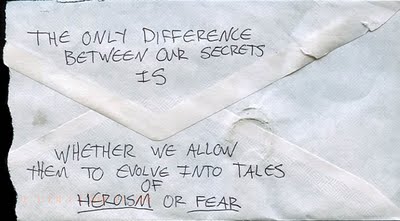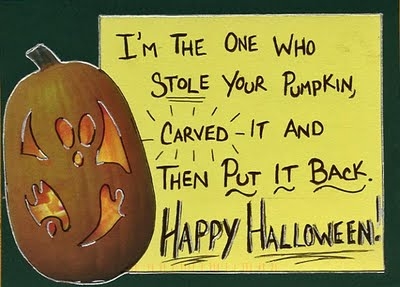
I respect secrets. When my grandmother died at age 96 and a half, her final words were: “Erase my email.” Why? I don’t need to know. And she is not someone you want to cross (present tense — her spirit is still here with me, urging me to live a big life.)
But I am also a voyeur. So I visit PostSecret and greedily drink each one, like I’m doing shots of other people’s truth.
PostSecret’s creator, Frank Warren, opened a door for people to creatively reveal themselves to, essentially, themselves. And, when everyone rushed in to share, he let us all in on the biggest secret: we are all imperfect, we are all human.
I should note that PostSecret is not all heavy and dark confessions — apparently a lot of people want to share that they pee in the shower!
This intoxicating mix of fun and hard truth is also what attracts me to the Unmentionables of Health series curated by Alexandra Drane at Health 2.0. Each year we peel back the layers of life and health in those talks, giving people permission to see themselves in the stories we tell.
Digging deeply into one person’s secrets is another way to face your own. Meghan Daum‘s essay collection, The Unspeakable, is one such opportunity. She writes with such honesty, clarity, and specificity that I glimpsed myself in her mirror, as I glimpse myself in some of the PostSecret cards. And yet she goes farther. She is so unflinching in her judgment of her foibles and flaws that I ended up feeling rather pleased — thank goodness I’m not that neurotic, I tell myself (while studiously looking away from my own shortcomings).
Read how she gives herself permission to give up on things — an “un-American” view, she says:
The key to contentment is to live life to the fullest within the confines of your comfort zone. Stay in safe waters but plunge as deeply into them as possible. If you’re good at something, do it a lot. If you’re bad at something, just don’t do it. If you can’t cook and refuse to learn, don’t beat yourself up about it. Celebrate it. Be the best noncook you can be.
Daum tells us secrets — not all her secrets, she’s clear about that — but enough to make you feel a little braver about owning up to your own unspeakables.
Here is the lesson I take from all of these sources, from my grandmother on down: Speak the truth to yourself even if you only write it on a postcard or think it to yourself as you listen to or read another person’s words. Let yourself in on your own secrets.


> live life to the fullest within the confines of your comfort zone.
Yes. Year after year this comes up, in me or my family: it’s so important to know when something is more than you can handle, and let it go.
I think it’s probably even the core of the Serenity Prayer.
I find it helpful, too, to remember something Howard Gardner talked about in his work on multiple intelligences: any competence is entirely situational, dependent on the moment or our point in history … being a chess master was of no use before chess existed, etc. It’s so helpful to become comfortable in our own skin, our own soul being, even if we’re shoehorned into somebody else’s present universe.
Beautiful! I love this amplification. Thank you, friend 🙂
Great post for the new year, thanks, Susannah.
Dave, you might enjoy Eileen Flanagan’s, “The Wisdom to Know the Difference.” She’s a young Quaker writer who puts the last line of the prayer into a deeper space of inquiry. Hers is a beautiful read and one that many will savor.
As I write, it strikes me just how relevant the theme of “knowing the difference” is for health innovators. Foresight into whether one’s projects are helping or hurting seems like an important Step One Thought. Helping can be as simple as hugging. Hurting can be adding ten more clicks onto a workflow that a sick and scared patient is already hassled by.
Perhaps we would reduce the number of #failhalos if we could discipline brainstorming with dedicated, conscious reflection on themes of “knowing the difference”. Kind of a cool thought…
But back to secrets. I like Post Secrets. It’s a great toe into imperfection and loss processing.
Personally, the secrets that are most difficult for me to make transparent relate to early, early shaming events that powerfully connected speaking the truth to being made fun of. Yuk. Who can forget that stuff? Powerful, dense blocks were generated.
Feeling shame is such a negative sensory experience that lots (and lots) of us still spend a good amount of our processing power on fitting in and gaining access to a predictable group. That looks like competency …
But I wonder about what’s next. If we consciously unhook from the early maps and patterns and — literally — can we get more transparent and keep pace with the flow? If we don’t do that, will we have more burn out or fragmentation?
That’s been my experience anyway and it is another way of expressing what I sense Dave is talking about when he says, “It’s so helpful to become comfortable in our own skin, our own soul being, even if we’re shoehorned into somebody else’s present universe.”
The best news is that bringing the light into one’s own experience promotes transformation of the present universe. It’s simple, right? Micro, micro, uber micro transparencies will aggregate. Eventually.
[Drafted this last night & didn’t click send!]
Boy, this is the third time in an hour my thoughts have gone back to my best friend, Dorron Levy, who died 13 months ago. The core to his incredible wisdom was his ability to see when people were fighting a law of nature, even if they didn’t know it … and in all three of these instances tonight, the connection was via Clay Shirky’s incredible TEDGlobal talk in 2005.
In particular, he talks about “power laws,” which are the core of the whole “long tail” phenomenon, the 80/20 rule, the shift from institutions to collaboration, and all kinds of things. People who are experts in a current reality get completely blindsided time after time when restrictions on participation are removed and people can connect at no cost, and some value that had been latent gets a chance to be realized … which is exactly what happens as the internet democratizes access to all kinds of things.
“The wisdom to know the difference” shows up in both the pre-liberation and post-liberation contexts of such a shift. Defenders of the pre-liberation reality need to realize they can’t stop the change, and the potential is real even though it’s invisible now; advocates of the post-liberation reality need to realize that though each individual is small, the shift is inevitable once the restrictions are gone, so they can be heard.
“The things we can’t change” and “knowing the difference” don’t just apply to interpersonal issues – they apply to laws of nature, too. #1 thing to bear in mind: when things refuse to change no matter how hard people work, there’s a good chance some gyroscopic effect is keeping things on their path.
And wow on this quote on the “pee in the shower” link – what a decade it’s been:
“Now, of course, there’s an app for that. In fact, there are several. But the world is a markedly different place today than it was a decade ago, when Warren began the PostSecret project. It was 2004: there was no Twitter, there was no Instagram, and Facebook had just launched out of Mark Zuckerberg’s dorm room. The iPhone didn’t exist. Edward Snowden was 21.”
I’m so happy that you clicked through on that! I worried about larding up the post with too many links, but each one is worth it, I swear.
And yes, what a decade it’s been.
This reminds me of one of the reasons we read Stephen King. He voices the thoughts we think but would never say.
Love this. I’m not a Stephen King fan (yet – have never read one of his books) but that’s what artists do, isn’t it? Ask the questions, push our thinking, mention the unmentionable. There is honor in being a fan, in holding a book close to your chest and saying, Yes, this is me too. The book that most recently made me feel that way is Amanda Palmer’s The Art of Asking.
Lovely year-end post. Happy and healthy 2015 to you and your loved ones!
Thanks, Danny!! And to you and yours!
I love the idea of letting yourself in on your own secrets. For me, it’s one of the primary reasons I religiously keep a journal and see a therapist. It is all too easy to gloss over my own motivations and hide from myself the things I am afraid of–both of those activities help remove the film of self-righteousness and self-justification… though it is a continual journey.
Thanks for a post that helps lend clarity in the new year.
Yes, it is a continual journey — we need daily reminders, little hacks, whatever it takes to keep us on the mindful path. Thanks, Jan!